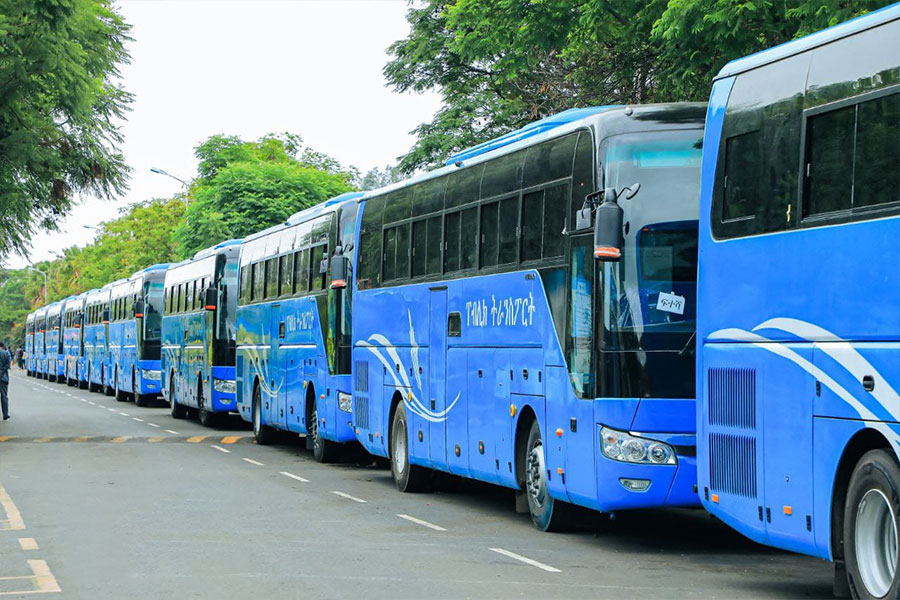
Fortune News | Jun 04,2022
Driving in Addis Abeba is no easy task, and the same could be said about many places across the country. Taking a vehicle on the road can be a little dicey. Drivers have to deal with everything from unyielding pedestrians and livestock clogging the streets to aggressive motorists and unmaintained roads full of potholes. Owning a vehicle is even more demanding, bringing all the additional requirements and costs associated with maintenance.
For Yigremachew Abayu, 27, the commitments are almost too much to handle. Residing with his parents in Addis Abeba, he works as a driver using the ride-hailing apps that have taken the capital by storm over the past few years. He owns a Toyota Vitz model from the early 2000s. He depends on the revenues the car generates for his livelihood. Yigremachew nets up to 800 Br on a good day, serving dozens of passengers. He tries to set aside what little is left over for rainy days after paying for gas and other necessities.
The past year has been one long rainy day for Yigremachew. Around 10 months ago, he needed to replace a tyre and bought one, the Chinese Linglong brand, for a little over 1,000 Br. Earlier this month, a bad puncture forced him to go looking for another one. He was asked to pay more than 4,000 Br for the same product. A disgruntled Yigremachew forked over the money.
Last week, he noticed his front-left tyre was quite severely worn down and went shopping for a replacement. The price had risen by 500 Br over 12 days. The dealers told him the familiar response most shop owners blame for the rising cost of goods.
"They only tell us it's because of the forex," Yigremachew told Fortune.
The foreign currency crunch is almost halting the economy, driving the unrelenting inflation. The depreciation of the Birr against major currencies is part of the equation. It is often brought up in conversations about the skyrocketing cost of living.
However, what is contributing to the misery of drivers like Yigremachew and, indeed, consumers at large, but goes largely overlooked is the shipping crisis haunting the global supply chain.
Ethiopia is one of the places where the effects of disruption in logistics are becoming evident. The crisis began in the wake of the COVID-19 pandemic, as lockdowns and restrictions began to take hold across the world. Factories in China, which produced nearly a third of all manufactured goods and recorded exports of almost three trillion dollars last year, shut down due to the virus. The effects were immediate.
Manufacturers across the globe were forced to cut down production or cease operations entirely. Unable to source parts, Fiat Chrysler Automobiles closed a plant in Serbia in February 2020. Hyundai was forced to do the same with its factories in South Korea that same month. As people in other parts of the world, mainly the developed economies, were subjected to lockdowns and restrictions, e-commerce and online shopping saw a boom. People working from home or attending classes from the comfort of their houses had more time on their hands.
Reluctance to shop outside, combined with large cheques in the mail as part of stimulus packages, meant they were encouraged to shop online. Governments worldwide pumped over 11 trillion dollars into their economies as a stimulus package in response to COVID-19 induced economic crisis. The global e-commerce sector saw a dramatic rise of nearly 20pc in 2021, to 4.9 trillion dollars, according to eMarketer. It is projected to grow to 7.4 trillion dollars in four years.
As orders on platforms such as Amazon and Alibaba (two of the nine most prominent online vendors) surged, warehouse shelves quickly ran empty. These companies rushed to place backlog orders with Chinese manufacturing plants. Serendipitously for online shoppers, China recovered from the pandemic sooner than other parts of the world, and factories there hastened to fulfil orders and ship goods out.
Global shipping companies find the North America and Europe market attractive compared to the ports in the Red Sea, which accounts just less than 0.3pc of global trade.
The massive backlog and the surge in demand translated to overcrowded shipping industry. Shipping giants like the Denmark-based Maersk began charging more than five times the pre-pandemic fees to ship containers to the United States or Europe from China. The price of shipping a single container to these markets surpassed 20,000 dollars, up from 4,000 dollars two years ago.
Last week, cargo estimated to be worth 22 billion dollars was stuck off the coast of California, with vessels facing waits of up to two weeks to anchor in ports.
The mismatch in the flow of shipping containers has fueled the global logistics crisis, leaving many frustrated.
Tilahun Chala, an importer, is among those vexed by the situation.
An importer of tyres and stationery items, Tilahun had ordered the shipment of nearly a dozen containers of tyres from China seven months ago. An order like this, routine for him, would take less than a month to reach Djibouti or Modjo, an inland dry port facility 77Km east of Addis Abeba.
Though Tilahun endures the delay, he is contending with the another consequence of the shipping crisis: cost. A year ago, he would have paid around 110,000 Br to ship a 40ft container from a port in China, the source of 26pc of Ethiopia's 13.8 billion dollars worth of imports in 2020. He has to pay out five-fold for each container now. Faced with the dramatic surge in shipping costs, Tilahun sees only two choices. He can get out of the import business or raise prices.
Like so many others, he has opted for jacking up the retail prices. Tyres designed for Toyota Hilux models go for 8,500 Br each at his store, double the price from a year ago.
"I'm sorry the prices are getting so high," he told Fortune. "We've no other choice."
Tilahun depends on the Ethiopian Shipping & Logistics Services Enterprise (ESLSE), the state-owned shipping monopoly, to ship in his goods. Operating with a fleet of 11 vessels, the Enterprise remains the sole provider of multimodal transport services, but it, too, has taken a hit. The Enterprise transported 150,000 containers last year, 20,000 lower than what its executives had planned earlier in the year. It had managed nearly 200,000 in the previous year.
Over the past few months, the executives have taken decisions they hope would cushion the impact of the global logistics crisis.
They quadrupled tariffs in May this year, citing the crisis and shortage of shipping containers. They went out shopping for 6,000 containers, more than half of which have already been delivered. Still, the measures have not made much of a difference.
Having a small fleet, the Enterprise often depends on global shipping giants such as Maersk and the Mediterranean Shipping Company (MSC) leasing slots. As demand and prices in North America and Europe have gone up, these companies have abandoned less attractive routes, including ports on the Red Sea, which account for less than 0.3pc of global trade.
The Enterprise leases slots mainly with the three shipping firms. It also secures space on other lines.
Lately, though, securing additional slots has become nearly impossible, says Roba Megersa, CEO of the Enterprise.
Importers like Tilahun have been left out in the cold, forced to sit and wait for their goods to make it onto a vessel. The Enterprise began offering waivers to importers almost five months ago, letting them use other shipping companies. It is a catch the Enterprise had enjoyed since 1999 after the federal government told all banks not to open letters of credit for importers if ESLSE does not ship their cargoes. Where goods are imported from ports not called by the shipping company, it was mandated to issue waivers for importers to find other shipping companies. A protective shelter granted by the state, ESLSE managers rarely issued waivers over the past two decades.
The current logistics crisis compelled them to relent. Over 1,300 waivers were issued in less than a year, and most of the recipients came back to ESLSE.
“They don't want to use the waiver because of the high prices other companies charge them,” said Roba.
Roba says the fees charged by the ESLSE are "fair", and much cheaper than rates charged by other companies. And importers pay in Birr, unlike the foreign currency requirement by international shipping companies.
The Enterprise was charging 9,223 dollars for a 40-feet container shipped from China in June. Although this is similar to what other shipping companies charge, the importers have more reasons to continue depending on the Enterprise than the lower shipping costs. The other shipping companies drop the cargoes at the ports in Djibouti, leaving importers to deal with the costs associated with offloading, clearing and inland transport. The waivers do not apply to multimodal services. They would have to go through the hassle of securing the shipment to the Port of Djibouti before hiring agents to transport the goods from there to the dry port and the final destination. It brings an additional 1,680 dollars for a 40-feet container.
This predicament led Tilahun to decide against the waiver, though he initially thought about using it.
“It's risky to import without using a multimodal service company,” says Tilahun.
The good news for Tilahun and other importers comes in a recent decision by the National Logistics Council. It approved the opening up of the logistics industry, offering permits for no less than five private operators to join the logistics corridor that has been the exclusive domain of ESLSE for two decades. Authorities in the transport sector hope the move will serve to open the clogging of the logistics line.
"Allowing up to five operators will encourage competition and improve efficiency," said Dagmawit Moges, minister of Transport & Logistics.
Not exactly, according to Roba, the CEO of ESLSE. He characterised the decision as something "not well-thought-out," doubting that there are any domestic companies with the capacity to meet the requirements for permits and operate both in Ethiopia and Djibouti. This would leave the gates wide open for the global shipping companies, which he believes would take over the market.
"They would kill the Enterprise," said Roba.
He has in mind state-owned shipping companies in Ghana, Nigeria and South Africa that were wiped out as a result of liberalisation in the early 1990s. Roba's voice in caution echoes the fear his predecessors such as Ambachew Abraha had had when they lobbied the government under Meles Zenawi for the imposition of the protective shelter.
Importers, however, continue to struggle to find cheaper and faster means to bring goods and merchandise to a country that brings in three times more than what it exports. This includes those bringing in essential goods, such as medicine.
Biotech Plc has been importing pharmaceutical products for the past 30 years. Sourcing products mainly from China, Pakistan and Europe, Biotech has faced serious hindrances over the past year. The shipping crisis is among the main impediments. Securing letters of credit from banks is another bottleneck for timely imports, waiting for over a year to get one from the Commercial Bank of Ethiopia (CBE) before applying for an extension.
“The import cycle is totally disrupted,” said Fitsum Alemayehu (MD), general manager of Biotech.
The company imports typically up to two dozen containers a year but only managed four last year. The delay in some cargo, particularly on emergency cargoes such as medicine, should be given priority, according to Matiwos Ensermu (PhD), professor of logistics and supply chain management at Addis Abeba University.
“Accurate forecasting and a special focus on import substitution is the way out,” said Matiwos, urging the government to avert the usual supply-chain problems, including port congestion.
For a maritime expert who has previously worked at the Enterprise and other shipping companies, boosting exports could be a way to fix the problems.
“If companies would confirm that there are goods for export waiting to be shipped out from the country, they would certainly take orders to transport imports,” said the expert.
Such is a proposition that will take time. It appears that consumers like Yigremachew will continue to be on the receiving end of the cost build-up due to a chronic foreign exchange shortage or crisis in the global supply line and logistics jam.
PUBLISHED ON
Oct 23,2021 [ VOL
22 , NO
1121]

Fortune News | Jun 04,2022

Fortune News | Apr 09,2022

Fortune News | Sept 18,2021

Radar | Oct 02,2023

Obituary | May 21,2022

Viewpoints | Jun 29,2019

Editorial | Feb 26,2022

Editorial | Aug 10,2024

My Opinion | Jun 21,2025

Fortune News | Aug 13,2022

Dec 22 , 2024 . By TIZITA SHEWAFERAW
Charged with transforming colossal state-owned enterprises into modern and competitiv...

Aug 18 , 2024 . By AKSAH ITALO
Although predictable Yonas Zerihun's job in the ride-hailing service is not immune to...

Jul 28 , 2024 . By TIZITA SHEWAFERAW
Unhabitual, perhaps too many, Samuel Gebreyohannes, 38, used to occasionally enjoy a couple of beers at breakfast. However, he recently swit...

Jul 13 , 2024 . By AKSAH ITALO
Investors who rely on tractors, trucks, and field vehicles for commuting, transporting commodities, and f...

Oct 18 , 2025
The political establishment, notably the ruling party and its top brass, has become p...

Oct 11 , 2025
Ladislas Farago, a roving Associated Press (AP) correspondent, arrived in Ethiopia in...

Oct 4 , 2025
Eyob Tekalegn (PhD) had been in the Governor's chair for only weeks when, on Septembe...

Sep 27 , 2025
Four years into an experiment with “shock therapy” in education, the national moo...